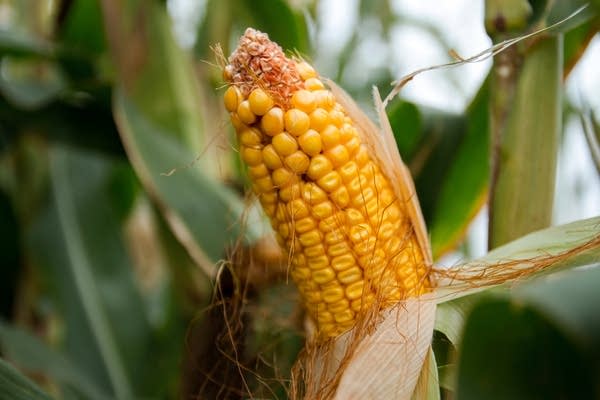For MN farmers, record-busting 2015 harvest was too much of a good thing
Go Deeper.
Create an account or log in to save stories.
Like this?
Thanks for liking this story! We have added it to a list of your favorite stories.

The final numbers are in for the 2015 Minnesota harvest, and it was a record-breaker. But the big crop also sent grain prices lower, hurting farmers' financial outlook as they prepare for spring planting.
The U.S. Agriculture Department's final estimate for the 2015 crop indicates Minnesota farmers harvested almost 1.5 billion bushels of corn and nearly 380 million bushels of soybeans — both records.
Farmers like Noah Hultgren from the Willmar area in central Minnesota had nearly perfect weather last year. And Hultgren's fields produced more bushels per acre than he's ever seen on his farm.
"We were real close to 200 bushel corn," said Hultgren. "Normally in our area, an average year, you're going to see between 175 to low 180s."
Turn Up Your Support
MPR News helps you turn down the noise and build shared understanding. Turn up your support for this public resource and keep trusted journalism accessible to all.
As president of the Minnesota Corn Growers Association, Hultgren talks often with his fellow farmers. While they're pleased with the big harvest in Minnesota and across the United States, they're not happy with the low grain prices. With large amounts of corn and other grains in storage, commodity traders are offering less to buy them. Hultgren said corn prices are as much as $1 per bushel below what most farmers need to make break even.
"Where prices are at right now, a lot of guys could be in the red," Hultgren said.
Many farmers are holding onto their crops, he said, storing grain in bins on their farms and hoping prices will rise. But right now the odds don't look good. Commodity analyst Bryan Strommen with Progressive Ag Marketing in Fargo said the global supply is up and demand is down.
The world's most populous nation, China, has reduced grain purchases because of a slowing economy. Strommen said no one is taking China's place as a buyer.
"If we can get some beans and corn moving around the world here, I think that would certainly be advantageous," said Strommen.
With demand weak, farmers could hope for a decline in supply to boost prices. But as a practical matter, that means wishing drought on some grain-producing region, something much of the Midwest has suffered through in recent years.
In any case, Minnesota farmers can't do much about China or the weather, so they just have to wait and watch, hoping that something happens somewhere to increase the value of their grain.
Dear reader,
Political debates with family or friends can get heated. But what if there was a way to handle them better?
You can learn how to have civil political conversations with our new e-book!
Download our free e-book, Talking Sense: Have Hard Political Conversations, Better, and learn how to talk without the tension.




